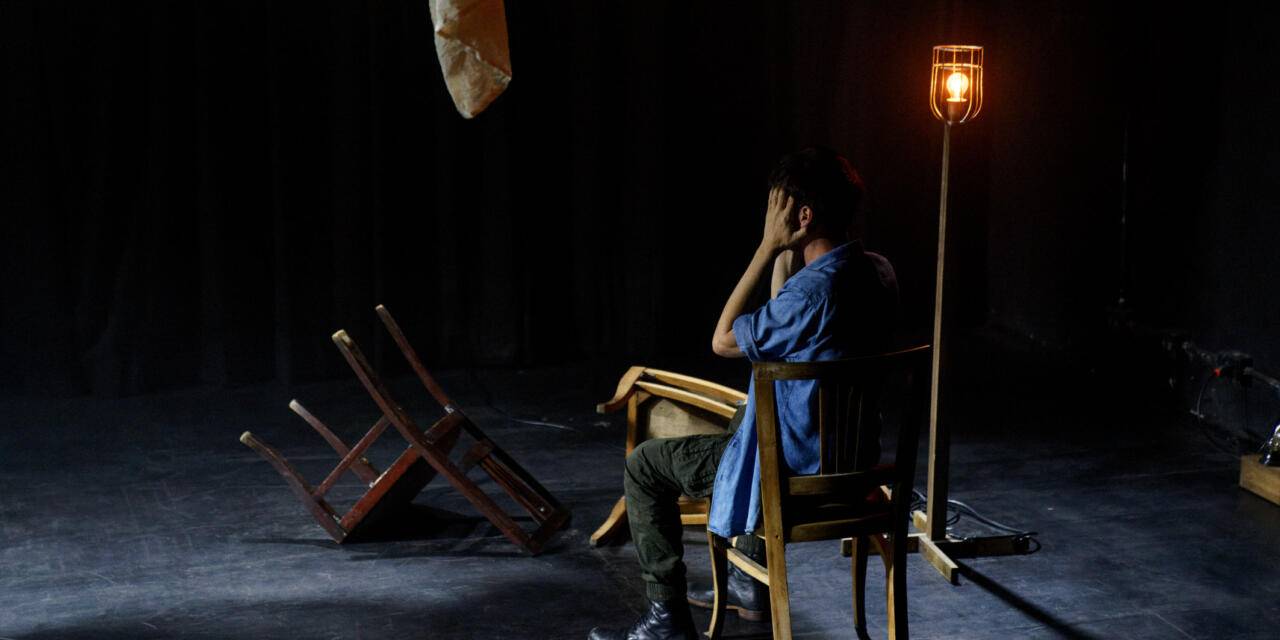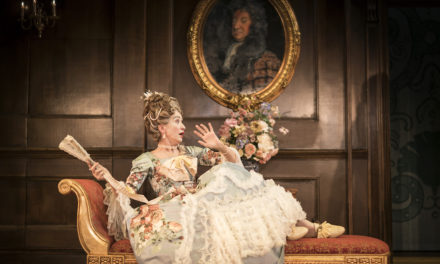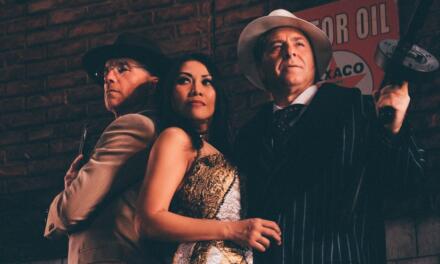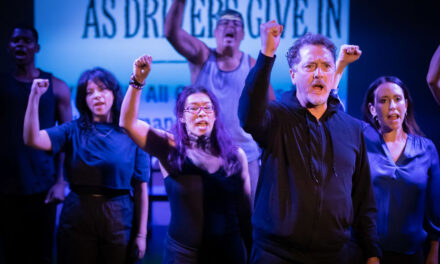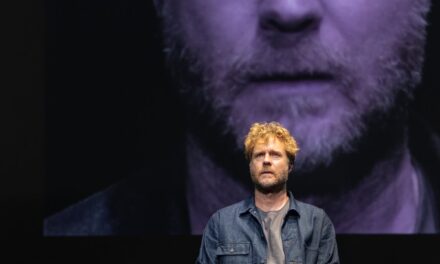El Brote (The Break) is the tale of an actor who doesn’t feel he’s had the career breaks his talent deserves. The opinionated Beto has taken on a range of secondary roles with a state-subsidised theatre company, touring classic plays from Shakespeare’s The Tempest to Calderón de la Barca’s Life is a Dream. He longs to play Creon but gets stuck with Teiresias and, from the margins and the wings, he observes and partakes in the bickering, rivalry and petty politics that shapes the company. He resents Claudio, the company’s keen-to-please artistic director. He is envious of the company’s lead actor, Quique, observing his every move and waiting for him to slip up so he can run to Claudio to moan that he is letting the company (and more importantly the audience) down. The lead actress is close to 60 and he spins stories of her taking on the role of Antigone with heavy make-up and a Rapunzel-like wig that is less than convincing. A back injury from the harness needed to portray the drama of Antigone’s death leads to her taking industrial strength sedatives – later used by Beto to wreck revenge on Quique. A younger actress coming through the company seems to attract both his pity and wrath. Beto is one of those people for whom contentment is an elusive concept.
Each of the company members Beto evokes are characterised with emphatic energy and a keen sense of difference. Actor Roberto Peloni gives a high energy performance as the actor who feels hard done by. He takes on all of the roles and moves effortlessly between the different company actors and the canonical characters they take – at one point spinning from role to role, delivering key lines from each in a different performance style that gained an impulsive round of applause from the audience. There is no doubt this is a virtuoso performance — a journey through the Western canon as much as the emotional moods of its bitter, resentful protagonist. Peloni is an agile performer who holds the stage for 90 entertaining minutes; he wants to be liked but cannot help criticising everyone around him. Quique is his nemesis and the rivalry gets progressively more absurd as the play unravels.
El brote merges the chaos of Noises Off with something of the subterfuge of Tootsie. Emiliano Dionisi directs his own amusing script, at times at breathtaking speed. The opening is particularly manic, immersing the audience is the chaotic world of the company struggling to get the show on with scant resources and too little rehearsal time. There’s a great deal of enjoyment in the game play that ensues, with Peloni confiding in the audience. We become his accomplices – and at times this makes for uncomfortable viewing as he hatches a plan that brings his Machiavellian thoughts to life with terrifying consequences. Micaela Sleigh’s design concept brings footlights and a curtain to the stage – heightening the piece’s metatheatrical dimensions. Chairs are used to create the different stages that Beto performs on. Lighting is dramatic and atmospheric. The music is as Baroque as the storyline. Indeed, everything about this production has a larger-than-life dimension.
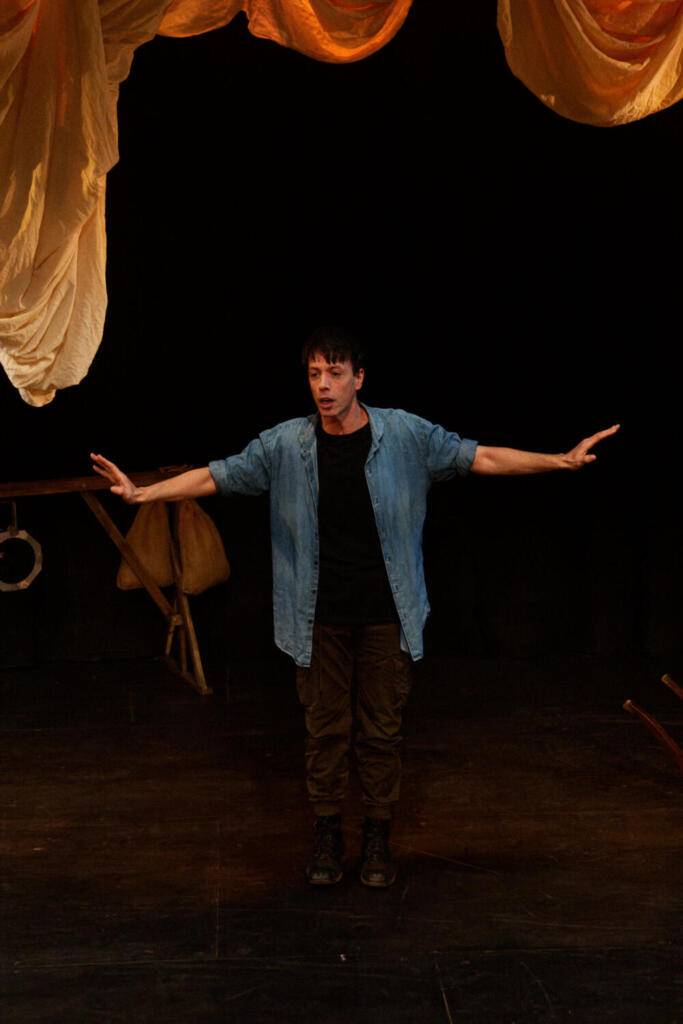
Roberto Peloni seeks the audience’s complicity in El brote (The Break): Photo: Compañía Criolla
Beto’s increasing merging of reality and fiction lends El brote a progressively darker dimension as he follows through a plot as extra-ordinary as that of Hamlet. It many ways the piece asks how “madness” is performed on stage and whether the tropes of performance obscure or illuminate how human behaviour is read by an audience. Beto rants against the cult of celebrity and a “holy” theatre, to coin Peter Brook’s term, that perhaps only ever existed in his imagination. The loud laughter of those able to follow the quick-fire dialogue — the subtitles struggle to do justice to the intricate language games that mark the play — turns to something a little less comfortable as Beto throws caution to the wind, with unsavoury consequences for all concerned. This may begin as a piece about a life in the theatre but it develops into a contemplation of frustration, desperation and despair that refuses to give up on its wayward protagonist.
El brote (The Break) played at Santiago a Mil from 19 to 21 January 2024 and then plays in Concepción on 23 January.
This post was written by the author in their personal capacity.The opinions expressed in this article are the author’s own and do not reflect the view of The Theatre Times, their staff or collaborators.
This post was written by Maria Delgado.
The views expressed here belong to the author and do not necessarily reflect our views and opinions.

